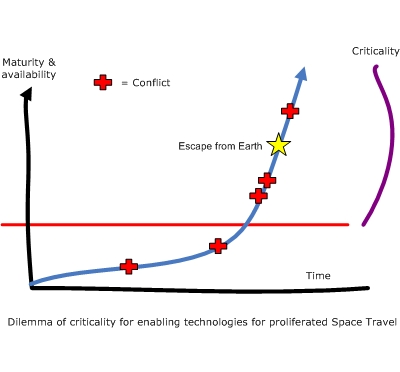When we look at the enabling technologies that might finally catapult the human civilization into space, several of them are actually also possible enablers for our own extinction. The challenge will be to develop them in a world of constant conflict and internal hostility in order to escape that conflict and hostility.

Let's look at an example: Nanotechnology. We have earlier believed that both nuclear weapons or genetic technology could be contained by national regulations or non-proliferation treaties, but none of these seems to have worked. One of the arguments against any fear of rogue states or terrorist getting their hands on nanotech-based weapons could be, that this kind of technology is wildly more expensive and complicated than anything else available. The same kind of argument could have been made against the spread of nuclear weapons - the Manhattan Project had a budget that was larger than the American car industry of its day. Yet today we realistically fear dirty bombs and even amateur nukes based on nuclear explosives that are missing from Russian stockpiles or dealt illegally. Countries like India, Israel, Pakistan and possibly North Korea has nuclear weapons. Iraq was once underway to get them and Iran is being suspected of wanting to have them. The US is seriously considering to change its own nuclear doctrine in order to be able to bust deep bunkers, some analysts even postulate that Japan might be a nuclear nation one day and who knows what the Russians are up to. This should more than prove the point that once the genie is out of the bottle, it will never fit back in.
Now, nanotech is characteristical in the way, that the more sophisticated enabling technologies are, the more potentially dangerous they are. Nanotechnology holds a mind-boggling promise and equal threat. So how can we make sure that we survive the dawn of the Nano Age?
Beats me. A suggestion: work fast. Nanotech is weird in the way that a lot of its applications have been designed before the technology is available. Everybody is just expecting the technology to force itself into existence to fill the many dreams it has fuelled. So another suggestion could be: work the most important bits first - meaning the stuff that is needed for space travel. Escape the dilemma of criticality.

 Let's look at an example: Nanotechnology. We have earlier believed that both nuclear weapons or genetic technology could be contained by national regulations or non-proliferation treaties, but none of these seems to have worked. One of the arguments against any fear of rogue states or terrorist getting their hands on nanotech-based weapons could be, that this kind of technology is wildly more expensive and complicated than anything else available. The same kind of argument could have been made against the spread of nuclear weapons - the Manhattan Project had a budget that was larger than the American car industry of its day. Yet today we realistically fear dirty bombs and even amateur nukes based on nuclear explosives that are missing from Russian stockpiles or dealt illegally. Countries like India, Israel, Pakistan and possibly North Korea has nuclear weapons. Iraq was once underway to get them and Iran is being suspected of wanting to have them. The US is seriously considering to change its own nuclear doctrine in order to be able to bust deep bunkers, some analysts even postulate that Japan might be a nuclear nation one day and who knows what the Russians are up to. This should more than prove the point that once the genie is out of the bottle, it will never fit back in.
Let's look at an example: Nanotechnology. We have earlier believed that both nuclear weapons or genetic technology could be contained by national regulations or non-proliferation treaties, but none of these seems to have worked. One of the arguments against any fear of rogue states or terrorist getting their hands on nanotech-based weapons could be, that this kind of technology is wildly more expensive and complicated than anything else available. The same kind of argument could have been made against the spread of nuclear weapons - the Manhattan Project had a budget that was larger than the American car industry of its day. Yet today we realistically fear dirty bombs and even amateur nukes based on nuclear explosives that are missing from Russian stockpiles or dealt illegally. Countries like India, Israel, Pakistan and possibly North Korea has nuclear weapons. Iraq was once underway to get them and Iran is being suspected of wanting to have them. The US is seriously considering to change its own nuclear doctrine in order to be able to bust deep bunkers, some analysts even postulate that Japan might be a nuclear nation one day and who knows what the Russians are up to. This should more than prove the point that once the genie is out of the bottle, it will never fit back in. 

